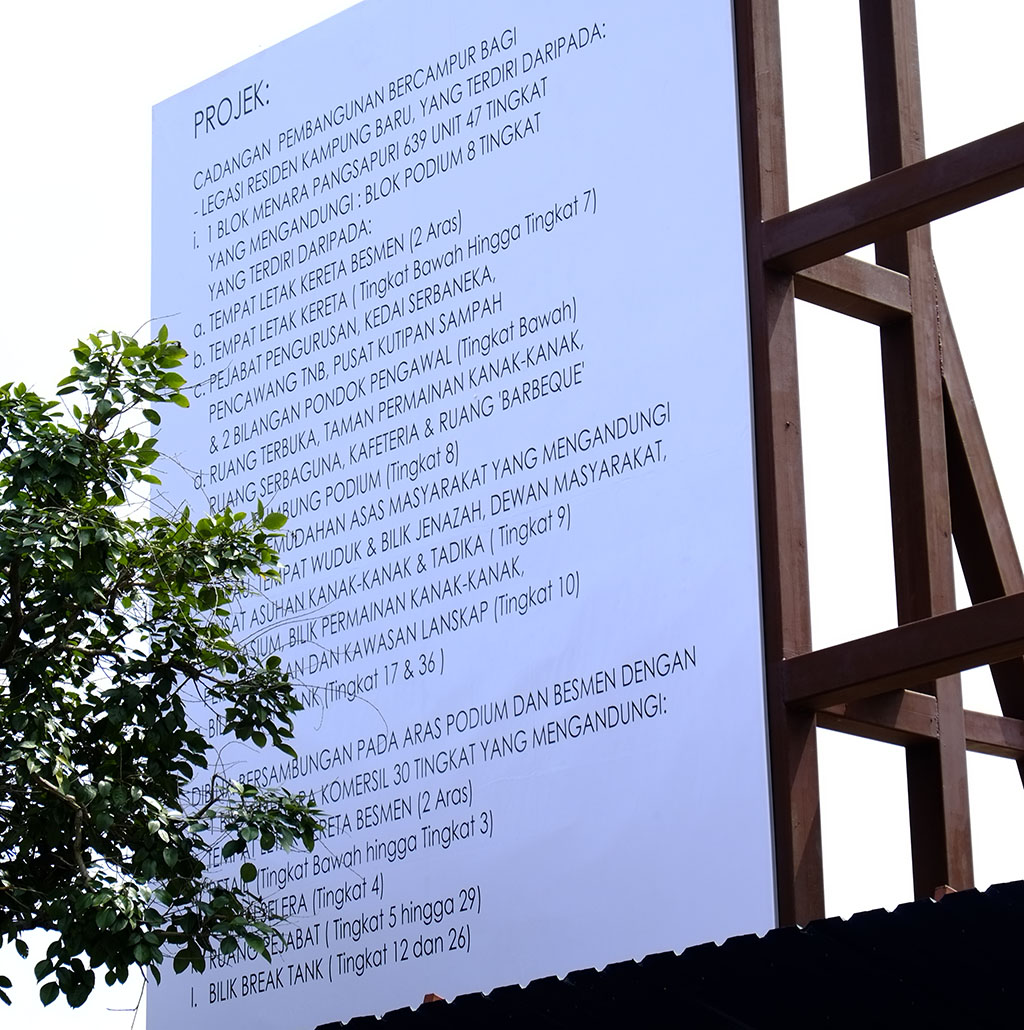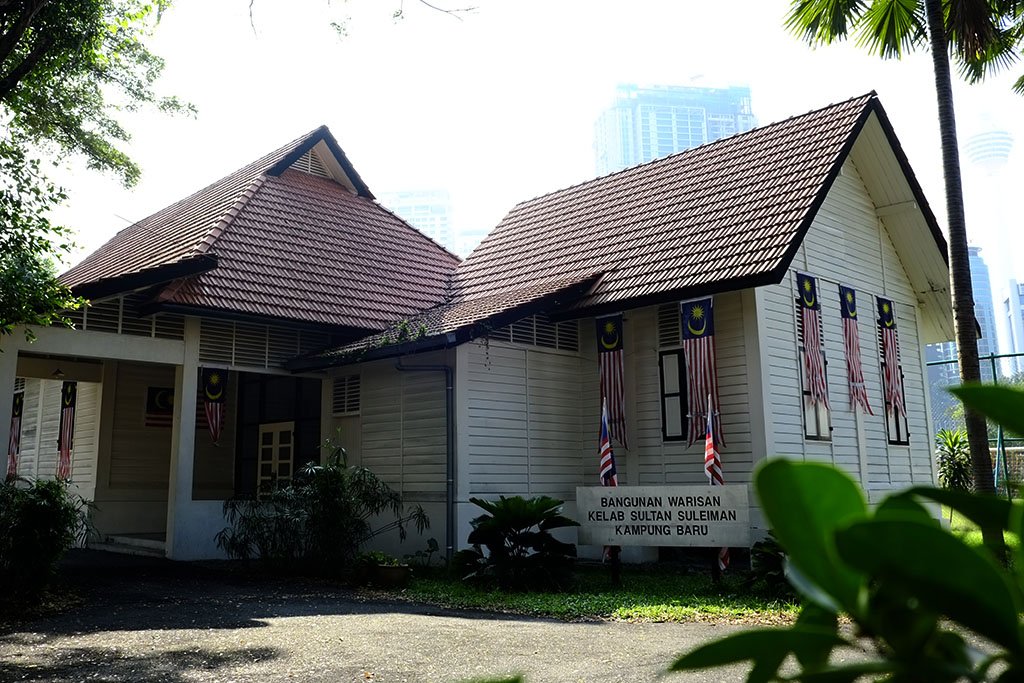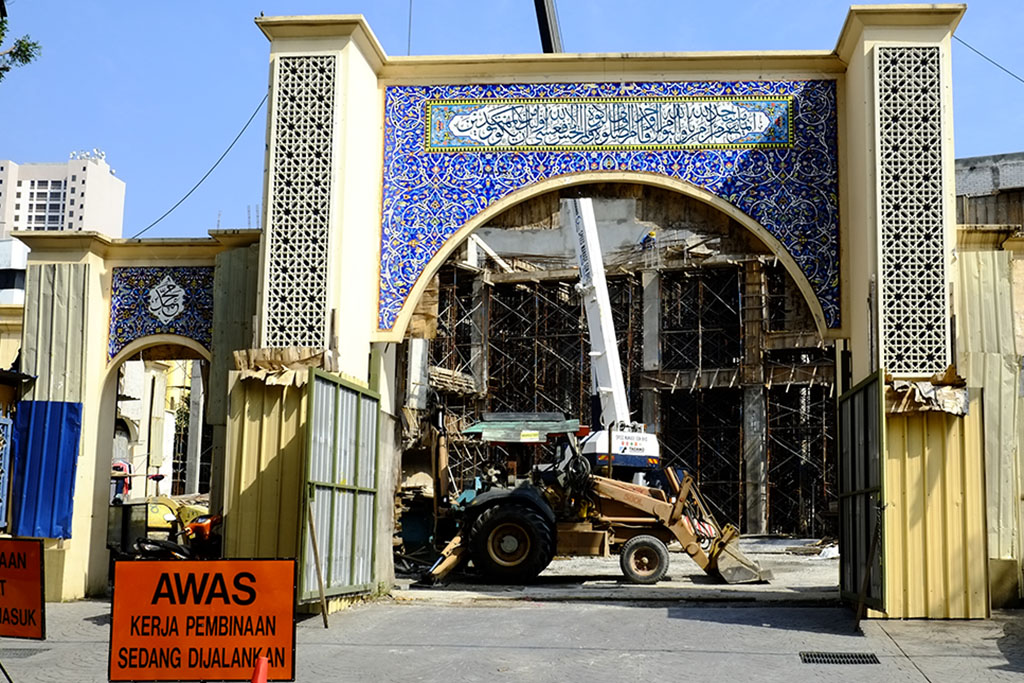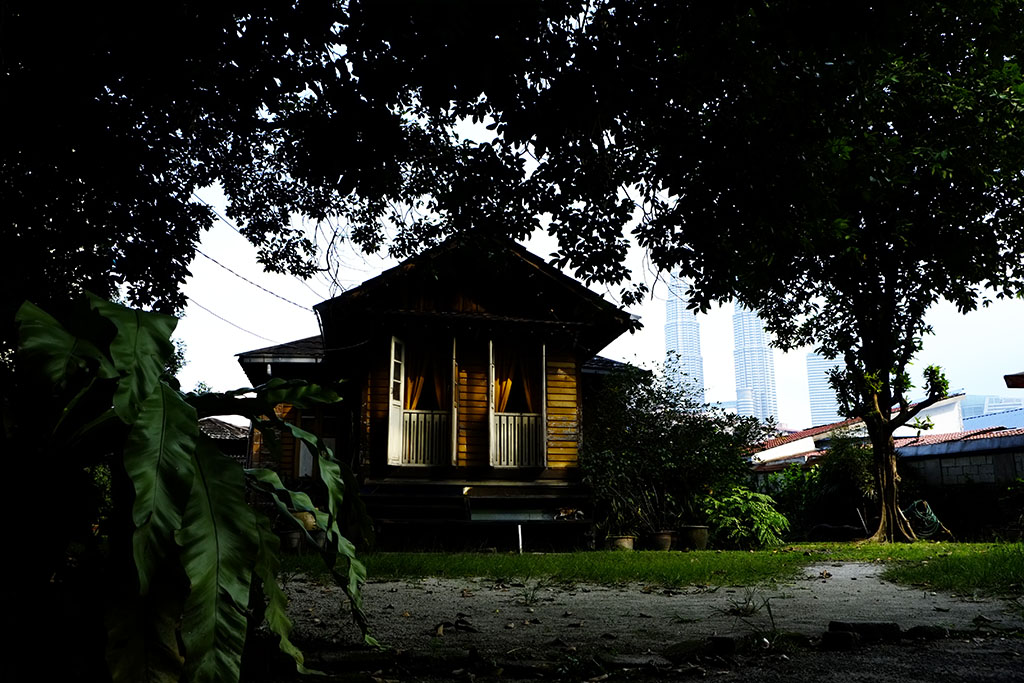Kampung Baru — in the heart of Kuala Lumpur — is a goldmine for property developers and companies wanting to ‘unlock its value’ for redevelopment. But what do the people living there feel about this plan? We headed to the century-old settlement to find out.
Words by Susan Tam
Photos by Kamal Sellehuddin
“How dare they. How dare they use that language with us.”
Seventy-year old Zainal Ibrahim was not pleased when we asked him about the Kampung Baru redevelopment plan.
Having lived in Kampung Masjid — located within Kampung Baru — all his life, he now faces the threat of losing his 100-year-old home to the massive development. Kampung Masjid is one of seven villages located in this settlement.

Zainal Ibrahim, 70, could lose his 100-year-old home.
“How can they say they will use laws to grab our land. Wait till their heads get chopped off,” were his strong words.
He was reacting to reports which quoted Deputy Prime Minister Muhyiddin Yassin as saying that the government will acquire (Kampung Baru) land if necessary, as permitted by law. Under provisions of the Land Acquisition Act 1960, authorities are allowed to acquire land for the purpose of development.
READ: Heritage in Malaysia: Saved or demolished?
READ: The fight to save Brickfields’s Vivekananda Ashram
“You’re a DPM. You shouldn’t make that statement. Tomorrow, Barisan Nasional will ‘fall’,” said this old-timer of Kampung Baru. His was a statement that reflected how voters would react to the ruling coalition should the government go ahead with the plan.

Zainal’s home in Kampung Baru.
Zainal was reacting to the recent unveiling of the Kampung Baru Detailed Development Master Plan 2020. This huge initiative consists of projects totalling RM43bil that are planned over the next 20 years. Muhyiddin had reportedly said that the government would retain the tradition and heritage of the place and ensure that current residents would not be sidelined following the developments.

Protest banners seen in Kampung Baru.
“The issue of multiple titles is not solved, how is the government going to get the agreement of the many heirs to the land titles,” the father of one adds.
Kampung Baru was set up 110 years ago, and run by the Malay Agricultural Settlement Administration Board, responsible for the welfare and interests of landowners. The government had approved the Kampung Baru Development Body 2011, a legislation that allows redevelopment of this area.
The settlement, comprising mainly Malay Reserve Land, is off-limits to non-Malays, but developers wanting a piece of it face complexities of dealing with the multiple owners and heirs of the land. Adding to the complications are Muslim inheritance laws, where large pieces of land are cut up into smaller plots.
We then told Zainal that the reports state that the government had claimed to have agreement from 88% of Kampung Baru landowners.
“Who? Who are they? I’ve not signed any papers. Maybe the 88% they claim just reflects the attendance to the meetings they have with residents.” He mocks the reports by saying that reporters will report what the government says, but individual views or consent have not been obtained.
“They give us lots of information, but, many more heirs have not been consulted. How to go ahead?”
One of the major issues is trust. The site of Zainal’s house is earmarked for a pond as part of the plan, and he’s not happy with it.
“ I ask you, if this is your house and if someone wants to build a pond on it, do you agree or not?” he asks us in return. He feels that the one-off compensation doesn’t justify the move to demolish his home and turn it into a pond, which he claims can be changed along the way.
His faded mustard wooden house is probably one of the few remaining classic Malay houses in Kampung Baru, and attracts tourists who visit the city.
“What if they change the plans later to build a multistorey building, and the value of that property goes up, they will profit. Can they share the profits from each unit with the landowners?” he asked again.
We then asked if he would give consent if he was given a share of that type of development, he laughed and said, no, “I still disagreed with the plan.”
“They can manipulate. Humans these days don’t keep promises. You sign anything, they will manipulate. In the past, when people made verbal agreements, yes means yes and no means no. Now, it doesn’t work that way.”
READ: 10 English words that have been completely bastardised by Malaysians
READ: 10 English words you didn’t know had Malaysian roots
We then headed to Kampung Pindah, where we met with coconut and sugar cane drink seller, Bakri Mukisan.
We asked him about redevelopment and his facial expression changed. He walked away from us and proceeded to chop coconuts angrily. After allowing him some space to calm down, he relaxed and started speaking to us again.
“I feel very angry. All I know about this plan, is that it is very hard to sort out. They (the government) have to get the consent of many generations.”
“I feel very angry.” – Bakri Mukisan, 61.
The 61-year-old stall owner runs his business on a five-foot way across of a construction site. The site, next to the Kampung Baru LRT station and council flats, reflects the start of some development already taking place at Kampung Pindah. A sign showed that over 600 condominiums were planned for that space, but did not indicate who was responsible for it.

“Yes, I support development but do it properly. Where are the people going to live if they move us out, a new flat? How will it accommodate our parents, children, grandchildren?”
Bakri feels that it doesn’t matter what happens to the area, the developers will enjoy the largest profit from the redevelopment. “It’s never about the people. It’s always about the money.”
“You (referring to developers) shift people, then how much compensation can you pay. Then you sell the condo for so much money, is that fair? Only those people with money can buy lah, what about us,” said Bakri, as his voice gets louder. Bakri is relying on his ancestor’s home, pointing out that he was too old to get a bank loan to buy a new house.
READ: Feeding the homeless in Kuala Lumpur: Buy suspended meals
Bakri dismissed reports that nearly all landowners are supportive of the plan, saying it is only the claim from those responsible for the redevelopment. The development body cannot force landowners to sell, he said, making this a difficult issue to resolve.

Redevelopment notice in front of Bakri’s stall.
The pensioner adds that the government must find a fair way of sharing the profit or income from with landowners, but he is not confident that will happen. “It will always profit them because they are the ones that invest the capital. Kita dapat sikit, dia orang dapat banyak. (We get little and they get more)”
His final words to us was, “Why not build more housing for the people? Why build so many luxury condominiums?”

We then spoke to a lady selling local desserts, and she told us that she is happy living in Kampung Baru. “I don’t want to move, I don’t agree with what the government wants to do.” But she declined to be photogaphed or named, and we soon learned why. As an Indonesian who came over to Kuala Lumpur in 1989, she’s at risk of being deported. And with the new vision for Kampung Baru, she is worried about where she’ll live if the plan is realised.
Moving on, we headed to the Gurdwara Tatt Khalsa, located at the edge of Kampung Masjid, near the Chow Kit area. The temple is listed as one of the attractions for tourists to visit on City Hall’s Heritage Walk. The Sikh temple’s treasurer Gurdarshan Singh told us that was “high time” that the government develop the area. We asked him why.
“Because it (involves) our country’s city centre, prestige is involved. If the area can be developed to become a commercial area, it’s a good thing,” he adds. Next to the temple there are plans to build a multi-storey building to replace Chow Kit market, and even the main mosque in Kampung Baru is being renovated and beautified, he explains.

Chow Kit market.
Gurdarshan believes that the Kampung Baru would be beautiful after being redeveloped.
Asked what he thought about the complaints from people living in Kampung Baru who were opposed to the plan and compensation rates, he said: “That issue, we (have) got no say. It’s individual issues because they have multiple land titles. We are not affected, we are a religious body and the government. They don’t disturb us. So that shows the government is quite helpful in that aspect.”

We spoke to a heritage expert and senior lecturer with Taylor’s University, Dr Nikhil Joshi, who emphasised the need for developers to consult with the community first before starting a project.
“Conservation is not mummification. It’s all about managing change. First and foremost, talk to the community and see what is most significant to them,” he told us on the phone. Nikhil has worked on various projects, mainly in Georgetown, Penang and Malacca.
Preservation should not take place for the sake of preservation, he said, “There is no point keeping an area as a museum if there is no community there.”
On the Kampung Baru development, he said, those wanting to develop it must engage with the community and make a priority list of what matters most for the community. “This may take a year, or longer, but it must be done.”
This conservation expert pointed out that the general problem with development is greed. “There is a difference between greed and profit. You can make a profit, if you develop with the right intention. No one will mind if there is a genuine development plan that results in creation of jobs and affordable housing,” he adds.
He gave an example of development in London where in prime areas, 40% of the project is allocated to building affordable housing for the community.









Reader Interactions